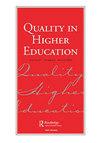高等教育质量工作:多方利益相关者研究
IF 1.1
Q3 EDUCATION & EDUCATIONAL RESEARCH
引用次数: 4
摘要
多年来,高等教育质量一直是政治议程的首要问题,引发了关于如何定义质量以及标准和评估如何促进质量的讨论。然而,文献往往忽略了构成“日常”质量的过程和实践。为了提高质量,了解关键利益相关者(即学生、教师、行政人员和管理人员)如何感知和实施质量是很重要的。根据一项调查的结果,本文旨在确定和比较丹麦高等教育机构质量工作的当地做法。分析显示,跨部门的学生、教师和管理人员在很大程度上对高质量的工作有共同的看法,强调有助于培养学生的学术技能、将这些技能应用于实践的能力以及教学实践的持续发展。然而,一些差异也很明显,例如在高等教育的就业能力取向方面。本文章由计算机程序翻译,如有差异,请以英文原文为准。
Quality work in higher education: a multi-stakeholder study
Abstract Quality in higher education has been at the top of the political agenda for years, motivating discussion of how to define quality and how standards and assessment can promote quality. However, the literature tends to overlook the processes and practices constituting ‘every-day’ quality. To improve quality, it is important to know how quality is perceived and enacted by the key stakeholders, namely the students, teachers, administrative staff and managers. Informed by the findings of a survey, this article aims to identify and compare the local practices of quality work at higher education institutions in Denmark. The analysis reveals that students, teachers and managers across sectors to a large extent share views on quality work highlighting practices that help develop students’ academic skills, the ability to apply these to practice and the continuous development of teaching practices. Some differences are however also apparent, for example, concerning employability orientation in higher education.
求助全文
通过发布文献求助,成功后即可免费获取论文全文。
去求助
来源期刊

Quality in Higher Education
EDUCATION & EDUCATIONAL RESEARCH-
CiteScore
3.30
自引率
14.30%
发文量
32
期刊介绍:
Quality in Higher Education is aimed at those interested in the theory, practice and policies relating to the control, management and improvement of quality in higher education. The journal is receptive to critical, phenomenological as well as positivistic studies. The journal would like to publish more studies that use hermeneutic, semiotic, ethnographic or dialectical research as well as the more traditional studies based on quantitative surveys and in-depth interviews and focus groups. Papers that have empirical research content are particularly welcome. The editor especially wishes to encourage papers on: reported research results, especially where these assess the impact of quality assurance systems, procedures and methodologies; theoretical analyses of quality and quality initiatives in higher education; comparative evaluation and international aspects of practice and policy with a view to identifying transportable methods, systems and good practice; quality assurance and standards monitoring of transnational higher education; the nature and impact and student feedback; improvements in learning and teaching that impact on quality and standards; links between quality assurance and employability; evaluations of the impact of quality procedures at national level, backed up by research evidence.
 求助内容:
求助内容: 应助结果提醒方式:
应助结果提醒方式:


